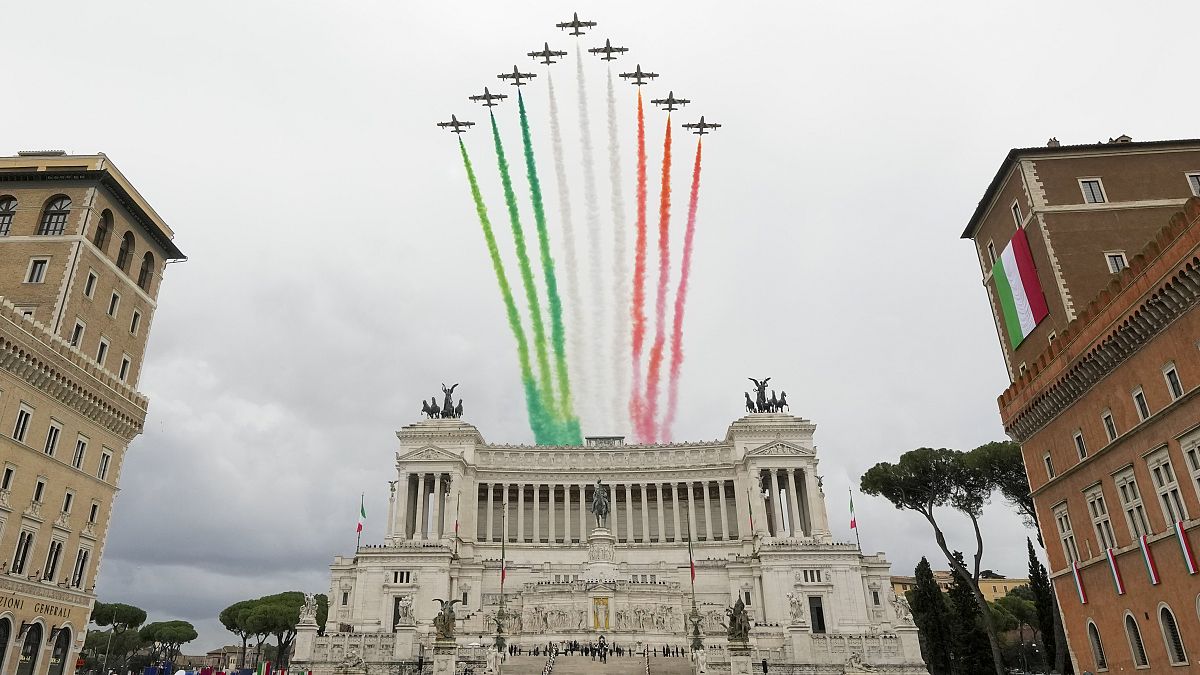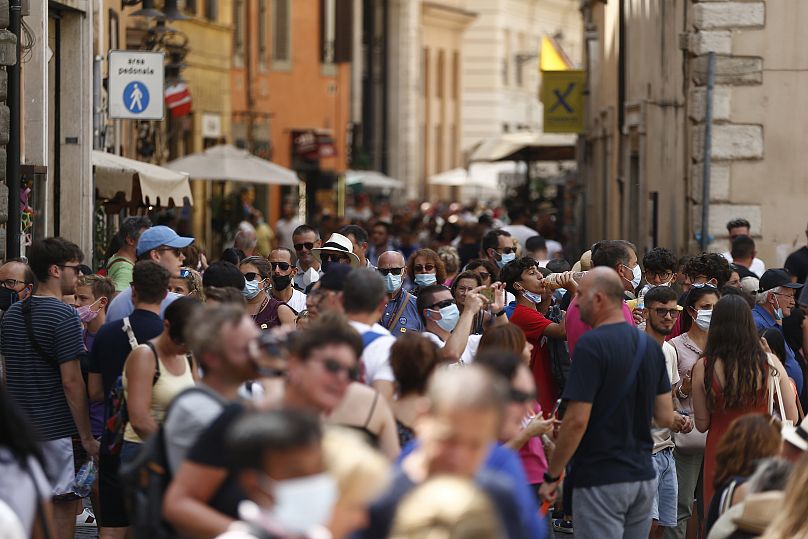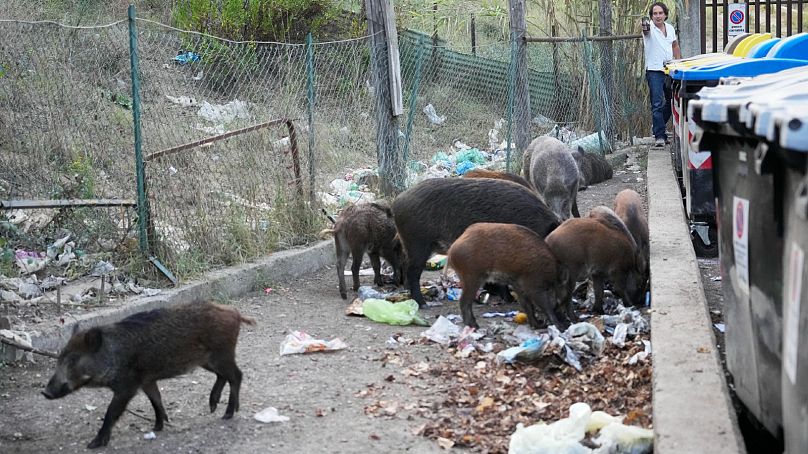A new mayor and tourists returning have sparked claims of a revival in the Italian capital. But not everyone is so optimistic.
Maskless tourists, enjoying the prolonged autumn warmth, flock to flower stalls and street painters at the top of Rome’s iconic Spanish Steps. Such a carefree image of an idyllic, seemingly COVID-free future, however, is betrayed by the presence of a litter bin overflowing with plastic bottles and cardboard containers, tucked behind the Baroque stairway’s balustrade.
Scenes like this have become emblematic of Rome, a city of profound contradictions. Its historical centre is just as much a testament to the artistic marvels bequeathed by its glorious past, as of its millennia-old problems – with one ancient Roman garbage heap, Monte Testaccio, having itself become a recognisable part of the urban landscape. It suffices to say that when the COVID-19 pandemic hit Italy early and hard, it only added to its capital’s mounting pile of challenges.
Nevertheless, despite Rome’s many woes, there is a feeling of optimism in the city. Tourists are returning, especially after the city's profile was raised by the hosting of the G20 and matches of the postponed Euro 2020 football championships. Locals have also recently elected a new mayor – centre-left politician Roberto Gualtieri – after spending five years under the helm of the largely unpopular Virginia Raggi, from the populist Five Star Movement.
Such changes are sparking talks of a “rebirth” – a “Renaissance”, even – of the Eternal City. But others, jaded by years of empty hopes and failed promises, do not share in such optimism.
'The rebirth of Rome'
“The rinascita [rebirth] of Rome.” With these words, Roberto Gualtieri -- Rome’s new mayor as of 21 October -- heralded a new future of the city, evoking images of the Renaissance.
Alongside Florence, Rome was the epicentre of the Renaissance, a period of cultural “rebirth” spanning the late 14th to early 17th century, marked by a flurry of artistic and literary productions inspired by the ideals of classical antiquity. Rome underwent a monumental facelift during those years, as the greatest artists and architects of the age – Michelangelo, Leonardo da Vinci, Raphael, and Bramante, to name a few – were commissioned by Popes and aristocrats to redesign the formerly decrepit, plague-ridden city.
As the Italian capital now emerges from the shackles of what has (thus far) been the peak of the COVID-19 pandemic, some have directly compared the city’s regeneration to the Renaissance itself, especially after Italian prime minister, Mario Draghi, announced positive economic forecasts for 2021’s last quarter (in Italian).
“Rome is certainly in the midst of a new ‘Renaissance’ for tourism,” Daniele Brocchi, the director of tourism and culture of Rome's tourism and hospitality federation, told Euronews. “I’m highly optimistic. The number of arrivals we’ve seen in recent months has well surpassed what we were expecting, largely due to a boom in low-cost flights from other European countries, and are at an 80% higher rate than what they were in 2020.”
For a city whose economy relies heavily on tourism, such figures have inspired confidence within the hospitality sector. Alongside such an encouraging surge in foreign arrivals – in part spurred, as Brocchi opined, by Italy’s recent successes, ranging from its sporting victories to its Eurovision win – Rome’s reopening after the end of lockdown restrictions has breathed new life into its cultural institutions.
For example, the EUR district of Rome – which hosted the G20 summit – has been brought back to life as it is now the hub of an exciting set of events (in Italian), which will include over 600 artists.
Moreover, a film studio that had been abandoned for years has been restored as a major space for cinematic, artistic and other cultural exhibitions (in Italian).
In light of such developments, L’espresso – one of the country’s most widely-read publications –launched a seminar series this spring, titled “Rome reborn, country restored”.
“We find ourselves in a favourable economic situation in which domestic resources and European funds can help the city to turn the tide after COVID,” said Rome-based journalist Simone Fioretti.
Impressed by Rome’s phoenix-like revival and the avalanche of foreign arrivals to the city, Fioretti maintained that “the first signals of a recovery have been obvious since the summer, and [things] are going the right way”.
Sharing Fioretti's enthusiasm over prospects of the city’s regeneration, Brocchi said “if COVID doesn’t stop us in our tracks again, we’re headed in a very positive direction.”
Rome’s sceptical residents: 'I’ll be surprised if Gualtieri makes a difference'
While a burst in tourism and cultural events has certainly boosted morale, for many of Rome’s residents, the city’s longstanding problems are too numerous and too complex to inspire any significant degree of optimism.
For years, Rome has struggled with stifling bureaucracy, incompetent public administration, organised crime, extremist violence, infrastructural chaos – ranging from broken escalators in metro stations to exploding buses – and, most prominently, a waste disposal crisis that has metamorphosed into a never-ending odyssey.
Despite Gualtieri’s promises to clear the city’s streets of garbage by Christmas, having already embarked upon his ambitious €40 million plan, little seems to have changed. On Friday 12 November, over three weeks since Gualtieri took office, piles of trash yet again made local headlines as vandals in Villa Gordiani overturned dustbins, leaving streets covered in litter (in Italian).
Zoe Adams Green, a British linguist living with her Italian husband and son in Rome's suburbs, is particularly dismayed at the state of the rubbish crisis in the city. She expressed doubt over the likelihood the city’s newly appointed mayor would be able to successfully tackle its mammoth challenges.
“The situation with domestic rubbish and graffiti in Rome is shameful and detracts from the beauties of the Eternal City," she told Euronews. "It’s incredible that a European capital cannot get a grip on something as basic as cleanliness and hygiene.
“This seems to be a longstanding problem that mayors have failed to address. I will be pleasantly surprised if Gualtieri manages to make a difference.”
Indeed, previous mayors’ attempts to resolve the issue have been to little avail. Raggi, for instance – whose manifesto included an ambitious plan to clean Rome and promote recycling initiatives – routinely faced heated criticism over the city’s squalid state under tenure, which included wild boars roaming the streets, rat infestations, and sinkholes.
For Simone Alliva, a journalist and writer living in Rome’s vibrant Pigneto district, the city’s fortunes are even direr. Not only does he push back against any proclamations of a new Roman “Renaissance”, but he sees the capital as headed towards a downward spiral.
“Rome is in decline,” he told Euronews. “During the pandemic, we didn’t see it because we were all locked up, and the city even looked like a beautiful empty theatre. But public transport doesn’t work, the streets are always jammed, rent is sky high, the cultural landscape is moribund, and the city has been inundated with trash.”
“Much will depend on whether we, as citizens of Rome, will be able to preserve this millennia-old city and its history,” said Fioretti. “All the favourable conditions are here, even as this new council guides the city. Rome will only be reborn if it dares to try.”
Every weekday at 1900 CET, Uncovering Europe brings you a European story that goes beyond the headlines. Download the Euronews app to get an alert for this and other breaking news. It's available on Apple and Android devices.


